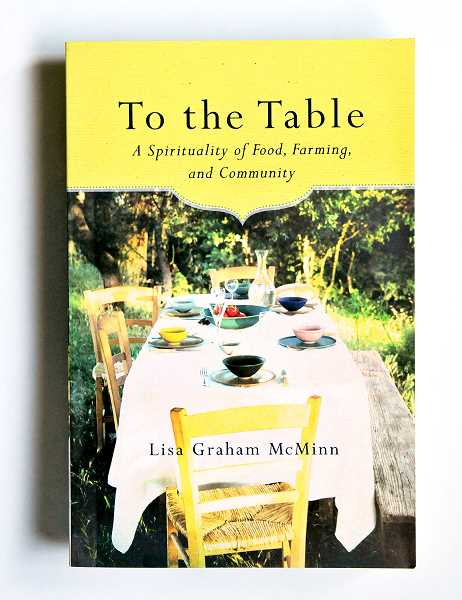To the Table
A Spirituality of Food, Farming and Community
by Lisa Graham McMinn
Lisa Graham McMinn’s book To the Table – A Spirituality of Food, Farming and Community (2016, Brazos Press) is a splendid publication to add to your collection of books about food and family life. It seems to be generally true that the table is the place most folks gather to discuss the big and small topics that concern us. McMinn, a professor of sociology and writer who is also a practitioner in the garden and kitchen, invites all of us to join her at the table to consider how we might grow, prepare and preserve food in an intentional and thoughtful manner.
In To the Table, McMinn carries the maxim “Think globally, act locally” into the family kitchen. By combining her love of gardening and meal making with her Quaker faith and a broad awareness of agri-business, McMinn has produced a book that expands the narrow scope of a traditional cookbook to include a wholesome, worldwide perspective on eating sacramentally. McMinn says about her book: “…I invite readers to remember what they have loved about food and have thought about farmers; I urge them to rethink the word drudgery, as in “cooking is drudgery.” Together, we will look at food from all sorts of angles including those that take our gaze inward, outward, and upward.”
McMinn says it wasn’t until she and her family moved to the Pacific Northwest that she became aware of the many scriptural references to food. She writes, “Only recently have I come to see the deeply spiritual nature of food — physical, fragrant, savory food.” Commenting on the Christian practice of communion, McMinn notes that most Protestants include food in the form of bread and wine for the commemoration of Christ’s sacrifice. In The Quaker faith it is done differently: “My own religious tribe, the Quakers, observe the sacrament of communion during quiet communal worship every Sunday rather than with the elements. We work to see all moments of life as sacramental — every meal as sacred time, an encounter with God… I embrace the practice, however feebly, because I want to be engulfed daily in God’s love and presence… When I pay attention, I more easily remember that life is sustained by God’s daily grace and the sacrifices that bring me food.”
Part of paying attention, says McMinn, is to take a fresh look at the concept of “communion” which depicts a close relationship with others or a membership. (The idea of membership is taken from the writings of Wendell Berry and Norman Wirzba, both of whom McMinn quotes frequently in To the Table.) As to membership, McMinn writes, “Jesus directed his followers to gather with thankfulness, to remember God’s faithfulness, and to give daily graces to and from each other.” These “daily graces” can be viewed as actions involving a family or church — this is a local membership. But, McMinn points out, [“We] do not live independently of others, but are sustained by the sacrifice and work of plants and animals, as well as…farm and ranch laborers, butchers and bakers, shelf stockers, and cashiers.” These actions are intersections with the global membership.
McMinn writes skillfully, combining global and local memberships by presenting recipes, gardening ideas and canning tips and fusing these with a brief overview of the history of food economics and suggestions for living out the Christian faith in food related activities. As you read To the Table you will notice that the author likes to link private and public occasions, homemade and factory produced items, spiritual and secular activities, and global and local ideas. McMinn seems to suggest in To the Table that we need to learn to straddle these areas and pay attention as we move between them. Here is the author’s introduction to “A Starter Guide to Food Preservation” : “Moving back and forth between preserving faith and preserving food might feel dizzying, like walking from starboard to port on a small ship in a choppy sea. Maybe the jarring effects of my shifting focus says something about a disconnect between faith and food. As communion makes sacred the earthy tangible truth that we eat in order to live, perhaps food preservation can remind us not only of our capacity to preserve that which fosters life but also God’s faithful, persistent love and preservation of life.”
McMinn’s book contains information you would expect to see in a garden-to-table cookbook written with global awareness, but she also inserts stories about family meals, and the joy of cooking together with friends. In writing about the resurgence of the practice of food preservation, the author tells the story of one of her young friends, Kim. McMinn met Kim at a church retreat where the participants sat together at tables talking about the things they loved. Kim mentioned she enjoyed preserving food; McMinn began a conversation with her on the subject and a friendship was born. In To the Table McMinn includes Kim’s advice to those reluctant to take up food preservation: invite them to make jam with friends. She reported, “You know how marijuana is the gateway drug? Jam is the gateway drug for food preservation. Just help people make some jam, and,” she shrugged her shoulders, “you’ll get hooked.”
To the Table – A Spirituality of Food, Farming and Community has the lovely addition of pen and ink illustrations by Brandon Buerkle. Another benefit is the inclusion of “Reflections and Questions” at the end of each chapter. While August is still upon us, gather food from your garden, set a gracious table and invite friends for a meal and book discussion of To the Table by Lisa Graham McMinn.

